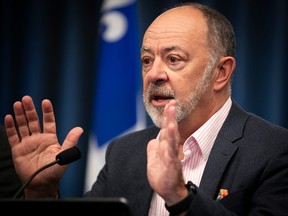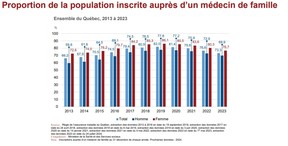Today, nearly 1.9 million Quebecers who are at least 20 years old do not have access to a family doctor.

Article content
Improvise and abdicate.
For some observers, those two words would best sum up the Coalition Avenir Québec government’s approach to health care since it was first elected eight years ago.
It was in September 2018 — a month before the provincial election that year — when François Legault made one of his key election promises: every patient in Quebec would be able to consult a family doctor or nurse practitioner “in less than 36 hours.” Yet if there is one promise the CAQ government has not been able to keep in its eight years in power, it would be that one.
Advertisement 2
Story continues below
Article content
Today, nearly 1.9 million Quebecers who are at least 20 years old do not have access to a family doctor, according to a Gazette analysis of data made public by the Institut de la statistique du Québec. In fact, the situation has grown worse steadily since 2019. The negative trend began even before the pandemic, which only exacerbated the crisis as a record number of Quebec doctors quit the public system.

Thus, it was tempting for Dubé to seriously consider a controversial plan that would have reassigned family doctors away from healthy patients to those deemed the most vulnerable. Dubé’s office and the Fédération des médecins omnipraticiens du Québec had been negotiating details of the plan in secret for months, according to Radio-Canada.
Coincidentally, the Institut national d’excellence en santé et en services sociaux (INESSS) — which is supposed to be independent — issued a report last week recommending Quebec give vulnerable patients (those with chronic illnesses or severe health issues) priority access to family doctors over those with minor or routine needs.
Article content
Advertisement 3
Story continues below
Article content
But amid a groundswell of public outrage over the plan, Dubé backed off the idea on Thursday.
“Quebecers who have a family doctor will keep one. We want to reassure the public that we’re on the right track,” Dubé declared in a post on the X social media platform.
“As we committed to in the health plan, our objectives are very clear: We are doing everything we can to facilitate access and simplify the organization of front-line care for all Quebecers. Now, let the negotiations (with the FMOQ) take their course.”
Dubé’s reversal was the latest flip-flop or improvisation by the Legault government when it comes to health care. In July, the Health Ministry quietly released a linguistic directive requiring Quebec anglophones produce an English-language eligibility certificate from the Education Ministry in order to receive medical services in English only.
Initially, Dubé and French Language Minister Jean-François Roberge denied the directive would restrict access to health care among English-speaking Quebecers, who were already finding it difficult to register with a family doctor, especially in the Montreal area. The two ministers — along with Eric Girard, in charge of relations with English-speaking Quebecers — even went so far as to sign a letter in The Gazette insisting “the government of Quebec imposes absolutely no linguistic conditions in health-care settings before providing health care in English to anyone who requests it.”
Advertisement 4
Story continues below
Article content
But after a backlash by the anglophone community, which accused the CAQ government of failing to consult it, the Health Ministry revised that directive two months later, dropping the requirement for the English eligibility certificate — proof the anglophone community’s concerns were justified all along. The episode once again suggested Legault’s ministers were improvising as they drafted new rules to conform to Bill 96, the government’s overhaul of the French language.
So in what state do Quebecers find their health-care system in today?
- In addition to the lack of access to family doctors, the number of Quebecers waiting for a consultation with a medical specialist has soared to at least 870,000, from just over 500,000 in 2020.
- More than 467,000 Quebecers are now waiting past the medically acceptable delays for a wide range of medical issues, including for ear-nose-and-throat ailments to problems requiring assessments by specialists like dermatologists, urologists, gastroenterologists and orthopedic surgeons, among others.
- Nearly 27 per cent of emergency-room patients who are on stretchers languish on them in corridors for longer than 24 hours — a chilling statistic that has not budged in the past four years.
Advertisement 5
Story continues below
Article content
(The Health Ministry used to make public figures on wait times for surgery, but those stats are no longer available on its website.)
Rather than tackle these problems directly, Dubé has instead decided to create a parallel bureaucracy at a cost of $60 million. Santé Québec, headed by a non-clinician, Geneviève Biron (formerly of the family-run and private Biron Health Group), is expected to start running the province’s $60-billion-a-year health system in December.
Critics have charged Dubé is effectively abdicating his responsibility to Santé Québec, which some argue will centralize the management of health care to an excessive degree.
“Nicolas Machiavelli would be delighted to see that the minister is applying one of his favourite tactics: setting up an underling disguised as a lieutenant,” wrote general surgeon Saber Labidi in Le Devoir last May, alluding to Santé Québec and Biron.
“This political tactic consists in strategically manipulating and using subordinates to achieve specific political or even personal objectives — getting re-elected, for example — while avoiding having to deal with the consequences of the policies implemented.”
Which brings us back to electoral matters. The next election is scheduled for October 2026. And if the current polls are any indication, the CAQ government could be heading toward a massive defeat — in no small measure because of its improvisational approach to health care.
Advertisement 6
Story continues below
Article content
Article content
Comments